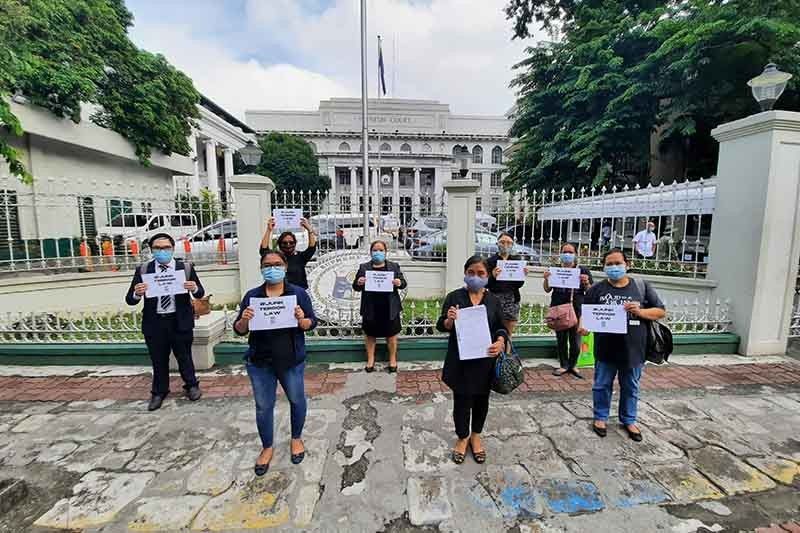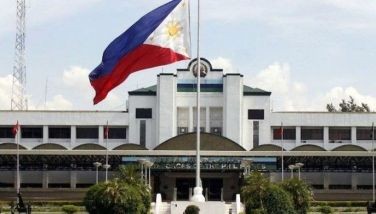Law groups file 17th legal challenge vs anti-terrorism law

MANILA, Philippines — A group of lawyers on Friday filed the 17th petition against the much-feared Anti-Terrorism Act of 2020, making it one of the highly-contested laws before the Supreme Court.
Alternative Law Groups (ALG), a coalition of 18 legal resource non-governmental organizations, filed a 135-paged petition before the tribunal, asking it to strike down Republic Act 11479 as unconstitutional and command the respondent government officials to cease from implementing the said law.
The new anti-terrorism law took effect on July 19, said the Palace while its chief legal counsel, Solicitor General Jose Calida said the law became in full force on July 22.
"In exposing the patent nullity of the Anti-Terrorism Act of 2020 (Republic Act No. 11479), this Petition invokes the people’s sacred freedoms - due process, privacy, right against unreasonable searches and seizures, free speech and expression, right to peaceably assemble, and right of association," ALG said.
"The Petitioner humbly asks the Honorable Court to take prompt action for the protection of these freedoms," they added.
'Chilling effect' on ALG's work
ALG engages in developmental or alternative lawyering and works with the poor and marginalized groups in different parts of the country.
It renders legal work concerning women, labor, peasant, fisherfolk, children, urban poor, indigenous peoples, person living with HIV-AIDS, persons with disabilities, elderly, incarcerated persons, local governance and the environment.
The group explained that part of the work in providing legal assistance to grassroots communities take the form of rallies, demonstrations, protests, marches and other activities. “All of these acts embody speech in a public forum,” they stressed.
They argued that RA 11479 uses terms that are “overbroad, ambiguous, and imprecise terms” that gives “too much enforcement discretion to the government.”
“Petitioner is directly affected in terms of being ‘chilled’ or ‘clipped’ in the performance of its legitimate functions of providing legal services to the basic sectors and grassroot communities,” they said.
SC jurisprudence, in Disini vs. Secretary of Justice, defines chilling effect as “the dear of possible prosecution that hangs on the heads of citizens who are minded to step beyond the boundaries of what is proper.”
ALG stressed that without “legal standards or criterion provided by the law to determine what is prohibited act from legitimate activities, and in light of deep-seated biases and prejudices against certain factors of society, Petitioner’s whole range of work and services run the risk of being ‘suspected’ or ‘designated’ terrorist activities.”
President Rodrigo Duterte signed the Anti-Terrorism Law on July 3 despite opposition from rights groups and civil society groups that it could be used to stifle human rights.
A petition against the law has been filed at the Supreme Court and other groups are preparing pleadings of their own.
Follow this page for updates. Photo courtesy of The STAR/Michael Varcas
National Security Adviser Hermogenes Esperon moves to block access to several websites, including news sites of alternative news orrganizations Bulatlat.com and Pinoyweekly.org.
In his letter to the National Telecommunications Commission, he only says the websites are "affiliated to and are supporting these terrorists and terrorist organizations."
No other basis to back up his allegation was cited in the letter.
Citing the designation of the CPP-NPA-NDF as terrorists, NSA Hermogenes Esperon moves to block access to several sites.
— Kristine Patag (@kristinepatag) June 22, 2022
In Esperon's letter to the NTC, he included news sites @bulatlat and @pinoyweekly; sites of other progressive groups RMP and Save our Schools. @PhilstarNews pic.twitter.com/nAzMITJFsS
The Commission on Human Rights says it "partly welcomes" the Supreme Court decision that some parts of the controversial Anti-terrorism Law are unconstitutional.
CHR spokesperson Jacqueline de Guia says the commission remains hopeful that the remaining contentious provisions of the law will be clarified by the high cour in the full text of the decision.
"At the same time, our commitment remains in guarding against possible human rights violations arising from the implementation of the anti-terror law. We steadfastly remind the government that countering terrorism and protecting human rights are not competing values but are, in fact, mutual and complementary," De Guia says in a statement.
The Supreme Court has deliberated and voted on the controversial Anti-Terrorism Act but the decision will be released "at the soonest time possible."
"However, considering that there were numerous issues resolved in the case, as well as the fact that each Justice had to vote on each issue, there is a need to accurately confirm and tally the vote of each Justice in order to ensure the correct resolution of the Court per issue," SC spokesperson Brian Hosaka says.
The Anti-Terrorism Council designates the National Democratic Front of the Philippines, the panel that negotiates for communist rebels during peace talks a terrorist organization.
Previous designation of the Communist Party of the Philippines and New People's Army led to the designation of supposed members of the CPP's Central Committee. Among those designated as terorrists were peace consultants.
Designation gives the Anti-Terrorism Council the authority to investigate and freeze the accounts of designated persons.
The Anti-Terrorism Council has designated 29 people, including alleged members of the Communist Party of the Philippines-New People's Army, as terrorists in two resolutions.
Designation allows the Anti-Money Laundering Council to freeze the assets of those on the list.
- Latest
- Trending

































